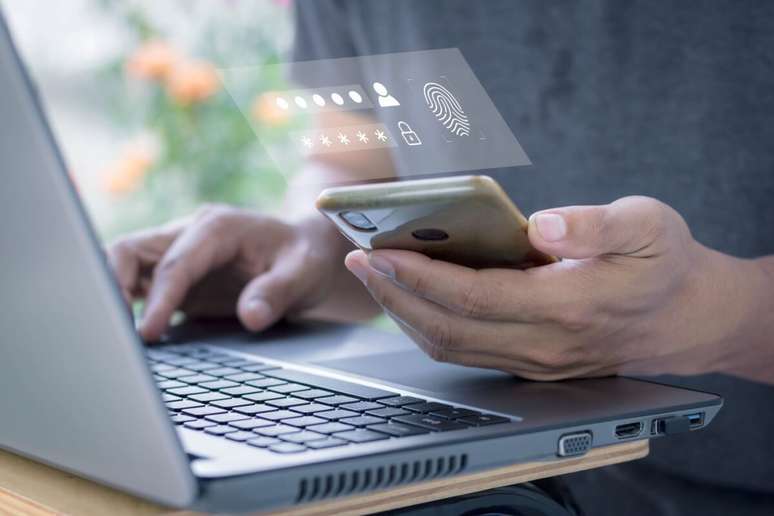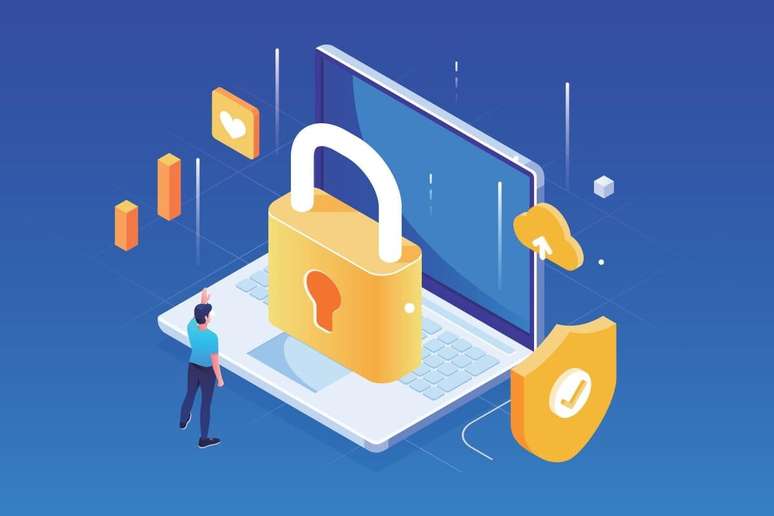Find out how simple attitudes can help keep your privacy in the online environment
On 11 February the Safe Internet Day is celebrated, a global initiative that aims to make the population aware of the risks and good practices to protect their data and their online privacy. With more and more aspects of life connected to the digital world, from social networks to banking transactions, it is essential to take measures to avoid fraud, blows and losses of information.
The concern for digital security is founded. The data on SurfShark show that in the third quarter of 2024, Brazil recorded 5.1 million online accounts, an alarming increase of 340% compared to the previous quarter. In addition, a Kaspersky study in collaboration with the Corpa consultancy company reveals that 58% of Brazilians take care of the loss of personal data, but do not know how to avoid it or what tools to use to protect themselves.
“Today we are very talking about safe internet, virtual blows, data losses and computer attacks. These themes are highlighted because Internet it became a basic need. I often use a metaphor: would you prefer someone to invade your home and steal your sofa or enter your Instagram account and delete all your posts? What would do more?
The main challenges faced by consumers
According to Kenneth Corrêa, one of the major challenges faced by consumers is the difficulty in understanding and managing the amount of personal information shared online. “Many people access the internet unaware of how their data are used or for those who are transmitted. The lack of transparency of some companies and the complexity of the terms of service means that users make informed decisions on their privacy,” he explains.
When companies collect data without a clear consent, the fundamental rights of privacy do not experience. “The risks are different: from the abuse of information for excessively invasive advertising to the loss of sensitive data due to security faults. These situations can involve serious consequences such as fraud, identity theft and financial losses”, warns the teacher ” The teacher warns FGV.

Protection in the digital environment
With the progress of technology and the increase in computer crimes, guaranteeing security in the digital environment has become a priority. Take a look at some essential practices to maintain your privacy and online security.
1. Use strong passwords and authentication of two factors
Easy passwords, such as “123456” or birthday dates, are still widely used and represent a great vulnerability. According to a NordPass survey, these are among the most popular passwords in the world and can be discovered by hackers in a few seconds. To increase protection, create complex passwords and enable the authentication of two factors (2fa) whenever possible.
“This technology adds an additional level of security by requesting an additional verification, such as a pin or token generated on the mobile phone, preventing unauthorized access, even if the password is discovered. Unfortunately, despite being an economic and highly effective tool, The 2fa is still very little used in Brazil, “explains Kenneth Corrêa.
2. Distribute and -mail and suspicious messages
Fraud From phishing They are one of the main means used by criminals to steal personal and financial data. The e -mails with promises of irresistible promotions, the invitations to save a puzzle of a famous brand or a company or even banking messages asking for data updates, all asking to click on the link, are just some of the thousands of versions of scams of phishing This cause financial losses to those who are victims. Before clicking on the connections or downloading attachments, make sure the message comes from a reliable source.
3. Keep your devices updated
Obasoleto software are easy objectives for IT attacks. Make sure to maintain the operating system, applications and antivirus always updated to correct vulnerability and guarantee greater protection.
“Today, existing technologies identify the algorithms of AI (artificial intelligence) to ensure the anonymity of the data, meet the LGPD regulatory requirements (general law on personal data protection)”, underlines the technological expert e Leader Martech From Keyrus, an expert in international consultancy company on data intelligence and digital transformation, Lucas Monteiro.
4. Limit exposure to personal data on social networks
Information such as position, full name and personal details can be used by criminals for scams and virtual attacks. Regulates the privacy settings of social networks and avoids sharing data publicly sensitive.
“It is essential that both companies and consumers include the importance of protecting data as name, address, financial history and consumer habits, ensuring compliance with the general law on data protection (LGPD)”, says the CEO and the CEO of Lina Open X CEO and CEO CEO (, Alan Mareines.
5. Report crimes and online hatred speeches
Digital security is also related to respect in the online environment. The data of the National Human Rights Observatory reveal that over 293,000 cases of hatred crimes on the Internet have been reported between 2017 and 2022.
“Insults, threats and persecution have become on the agenda, in particular on social networks and on game platforms, in which online interaction is intense. The impact of this behavior can be devastating, influencing mental health and the Wellness of the victims. unfortunately, in some spaces, these attacks are still treated as games, ignoring the true effects that cause “, says the mental health expert at work, Renato Hermann.
6. Read the terms of use before accepting
Data losses are increasingly frequent, exposing information sensitive by companies and users. A recent example is the attack on Pirelli, which has compromised the data of over 1,000 customers, 146 Brazilians. However, many users accept the terms of service without understanding what they are authorizing.
“People must learn to read the conditions of use, in particular girls, understand which authorizations grant and adopt safer practices to manage their data. Companies, in turn, should take on a more active role in the protection of information which collect, by investing in cyber security and transparency to avoid violations and abuses “, guides the IDK technology and the CTO expert Lucas Henrique.

7. Avoid public wi-fi networks without protection
Open networks can be explored by hackers to intercept personal data. Avoid the use of public wi-fi networks to transmit personal data; Opt for private connections or, if you need to use a private virtual network (VPN) to ensure a safe connection. Regularly review the authorizations granted to applications on the device, authorizing only access to indispensable information for its operation.
“When following these guidelines, it is possible to share information in a safer way, protecting privacy and significantly reducing the risks of exposure or improper use of personal data,” says Alan Mareines.
8. Keep the regular backups from your files
Your data can be compromised by attacks ransomware or technical faults. Save copies of safety On external devices or cloud to avoid the loss of important information.
By Letícia Carvalho
Source: Terra
Rose James is a Gossipify movie and series reviewer known for her in-depth analysis and unique perspective on the latest releases. With a background in film studies, she provides engaging and informative reviews, and keeps readers up to date with industry trends and emerging talents.






